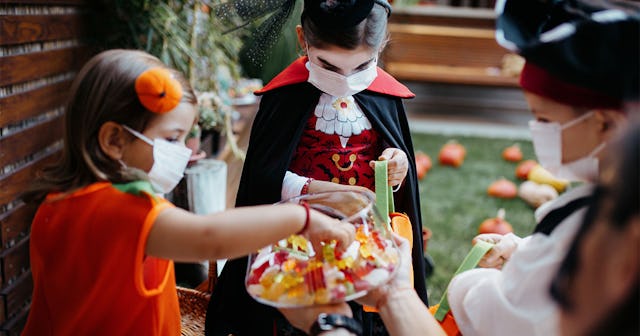Almost Half Of Americans Won't Hand Out Candy On Halloween This Year

According to two new surveys, about half of Americans are planning on skipping Halloween this year
Halloween, the spookiest holiday of the year, is a favorite of children and adults alike. However, despite the fact that the majority of people love dressing up and either passing out or gathering candy during the annual evening of trick-or-treating, due to the COVID-19 pandemic, Halloween isn’t going to be quite as much fun this year. In fact, according to two new surveys, about half of Americans are already planning on sitting out this year’s festivities.
One recent survey conducted by ApartmentGuide found that almost 46 percent of Americans desire zero interaction with strangers on their doorstep, and therefore, are planning on not handing out candy. However, 34 percent are planning on going about things normally, while 16 percent are planning on adjusting their evening to meet COVID-19 guidelines (for example, replacing trick-or-treating with a candy scavenger hunt or hosting a virtual costume party.)
Of those who will still be handing out candy, 30 percent plan on doing so in person, while 24 percent are going to leave their filled candy bowl outside. The survey also reported that 30 percent of those still planning on making contact with trick-or-treaters are over the age of 55 — considered high risk according to the Centers of Disease Control and Prevention.
See’s Candies also conducted a survey, finding that over 56 percent of Americans families are going to stay in and watch a scary movie instead of trolling for candy. Nearly one-third of people plan on turning out the lights to avoid the holiday candy passing out ritual. However, half of all those surveyed don’t expect that anyone will be knocking on their doors, anyway. Some parents who don’t want their children to miss out on the fun, are coming up with other creative ways to fulfill their trick-or-treating fix. According to the survey, 12 percent of survey respondents plan to engage in “trunk-or treating” instead.
While Halloween 2020 might be a wash, See’s does point out that many people see light at the end of the tunnel: nearly three-quarters of those surveyed (70 percent) believe we will return to our normal spooky traditions for Halloween 2021.
The CDC recently issued guidance surrounding all the holidays, including Halloween.
“Many traditional Halloween activities can be high-risk for spreading viruses,” they wrote. “There are several safer, alternative ways to participate in Halloween.” If you have been exposed to the virus, they warn against participating in in-person activities altogether.
The CDC laid out what would be considered safer ways to celebrate Halloween this year, encouraging people to participate in low-risk activities, including autumnal traditions like pumpkin carving, having a Halloween scavenger hunt, and watching scary movies with members of your own household or virtually.
Unfortunately, they deem most of the popular Halloween activities — including trick-or-treating door to door, visiting a haunted house, and attending costume parties — high risk activities. “Avoid these higher risk activities to help prevent the spread of the virus that causes COVID-19,” they urge.